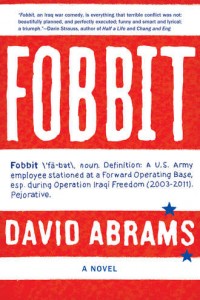 David Abrams, a former Department of Defense Military Journalist of the Year, deployed to Baghdad in 2005. FOBBIT, his debut novel, grew from the journal he maintained while serving there.
David Abrams, a former Department of Defense Military Journalist of the Year, deployed to Baghdad in 2005. FOBBIT, his debut novel, grew from the journal he maintained while serving there.
Like many others, I discovered David – and learned about his army service in Iraq – several years ago, through Dan Wickett and the Emerging Writers Network. Later, I became an enthusiast of David’s superb (and generous) work featuring other writers on his blog, The Quivering Pen (disclosure: David has championed my own collection, QUIET AMERICANS). I was thrilled to hear that David’s own debut novel had been bought by Grove/Atlantic and equally delighted when the prepub reviews came in (yes, they glowed).
In due course, I pounced on the opportunity to read an e-galley of the novel. You might not expect an Iraq War novel to be funny, but I laughed – more than once – as I read this one. I cringed, too. There’s simply so much to this book. It’s a privilege to be able to host David here and have him tell us more about it.
Please welcome David Abrams.
ERIKA DREIFUS (ED): David, congratulations on the publication of FOBBIT. The novel’s opening gives readers a pretty clear picture of what exactly a “Fobbit” is. But for those who haven’t yet read the book, please give us a brief definition.
DAVID ABRAMS (DA): A “Fobbit” is a mash-up of the terms FOB, or Forward Operating Base, and Hobbit from J. R. R. Tolkien. In THE HOBBIT, Tolkien gave us relatively shy creatures who liked to keep to themselves and stay inside the boundaries of their Shire. In Iraq and Afghanistan, soldiers who – for whatever reason – rarely go outside the confines of the military base are scornfully called “Fobbits.” They bury themselves with “busy work” and usually find excuses why they can’t drive out into the more dangerous neighborhoods of Baghdad. My novel follows two groups of soldiers – a combat arms unit out in the thick of things, and public affairs Fobbits who hang around the air-conditioned headquarters building all day.
ED: Knowing that you served in Iraq, I couldn’t help wondering how many of the incidents -particularly the more violent incidents – that are depicted in the novel “really happened.” Were there specific, actual incidents that you wished to present in the novel? Are any of them composites of actual incidents? Please explain.
DA: Most of the events in the novel are either wholly imagined on my part or are, like you said, composites of several different things I witnessed (first-, second-, or third-hand) while I was stationed in Baghdad in 2005. One violent incident, however, didn’t need any embellishment to give it dramatic impact – and that was the stampede at the Al-Aaimmah bridge over the Tigris River on August 31, 2005. I was working in my cubicle in the Task Force Baghdad headquarters that day, and I’ll never forget how shaken I was by the incident. Every new report that came to us from U.S. Army personnel on the scene brought increasingly bad news.
On this day, about a million Shi’a pilgrims had flocked to the Al Kadhimiya Mosque as part of a religious holiday. Tensions were high after an Al-Qaeda-linked terrorist group lobbed mortars into the crowd, killing seven and injuring dozens. Near the shrine, panic broke out after one person pointed a finger at another person and shouted, “Watch out! He’s got a bomb!” Everyone started to run for the bridge, only to find Iraqi police had sealed off the other end as a security measure against further terrorist attacks. The mob kept coming. Men, women, and children were crushed to death. Eventually, the pressure of bodies grew so great that the railings on the bridge broke and people started falling into the water. All told, nearly a thousand people died in that incident. It was literally “the shout that killed.” Man, I’m getting choked up and shaky just talking about this whole incident again. I guess you can see it left a pretty big emotional crater in me. As a writer, I knew I had to memorialize the sadness of the day somehow; that’s why I included it in the novel.
ED: Shifting gears a bit: How did you connect with your agent, Nat Sobel?
DA: Nat is actually my third or fourth agent (I never can remember the exact number). My first agent was great and sold one of my stories to ESQUIRE about 20 years ago. We eventually parted ways amicably and I went through the revolving door of another couple of agents before Nat found me.
Here’s how it all came about. The whole time I was in Iraq, I kept a journal. I’d been sending some of those dispatches back to Dan Wickett. With my permission, he posted a few of those war journal excerpts at his blog, the Emerging Writers Network. I got a pretty positive response from EWN members – they sent me emails and letters and care packages. Some of them probably had mixed political feelings about the war, but they all set that aside and reached out to me, the soldier-novelist who was feeling pretty lonely over there at the time.
Nat Sobel was of those EWN members who contacted me through Dan Wickett. The lesson to be learned here is, you never know what zigzag path an agent will take to find you. I had no idea publishing a couple of things at a blog would lead to this. But, lucky for me, Nat was reading the EWN blog. Like all good agents, he’s constantly reading a wide variety of things, both print and online. So, you just never know who’s out there discovering your work – but it’s up to you to get the work out there so it can be discovered.
The day Nat took me on as a client, I was having a bad day in the war zone. When I found out he was interested in my writing, it was one of those red-letter OMFG days. We corresponded by email during my deployment – I’d send him journal entries, and he’d send me back encouragement. In the months before I left Iraq, Nat and I toyed around with the idea of doing a memoir, but the market was glutted with Iraq War books at the time. And then Nat sent me an email which said, in part, “I’ve come to believe that only in fiction will this insane war finally reach an American reading public. And, only a modern day Yossarian can be that vehicle. That’s you, buddy.” I don’t think it’s too hyperbolic to say that email (and its reference to CATCH-22) changed my life. It got me thinking about how I could best deliver what I wanted to say about the war. That email was the seed that eventually grew into FOBBIT.
ED: I’ve heard of cases where writers – especially those who have served, say, in the CIA – have had to receive approval from their former employer before their books could be published. Did FOBBIT need to undergo any particular pre-publication review from military authorities?
DA: Like many writers with a day job, I kept my creative writing life to myself while I was in uniform. My novel-writing was the Mr. Hyde to the Army’s Dr. Jekyll. All the time I was writing FOBBIT, I knew I could probably never publish it while I was still on active duty. It’s not that I set out to write an anti-war or anti-Army novel, but I didn’t think my chain of command would understand why I drenched everything in satire. It would be like if you wrote a scathingly-critical memoir about your parents. It would be hard to publish something like that while they were alive, wouldn’t it? The same goes for me and the Army. I had to leave it before I could allow myself to write about it in this way. I retired from active duty in 2008 and never really looked back.
ED: David, you have a full-time, nonacademic “day job,” plus family commitments, plus an extraordinary and ever-updated book blog. I’m dying to know a) when you sleep and b) what a typical weekday looks like for you.
DA: Sleep? What’s that? It seems I’ve heard about something like that, but I’m not really all that familiar with it. Sadly, sleep has become one of the things I short-change the most in my life these days.
I do work a 9-to-5, 40-hours-per-week, Monday-through-Friday day job, so by necessity that dictates my writing time. I get up every day at 3:30 and fill the next five hours with as much creative writing, blogging, email, exercise and reading as I possibly can. It’s all fueled with strong cups of coffee, but if you notice some of the posts at The Quivering Pen are a little fuzzy around the edges, the writing not as sharp as it could be, that’s the reason. If I want to get any creative, non-blogging work done in the morning, it has to be the first thing I do, before the tyranny of email distracts me. The only way I can possibly discipline myself to do this is to kill the Internet connection on my computer the night before. I’m a morning writer, so when I come home at 5 o’clock, the evenings are devoted to spending time with my wife, my best friend in the world. We cook dinner, watch TV, and play Wii games. All in all, it’s a good life – even if the day does start well before the crack of dawn.
ED: Anything else you’d like us to know?
DA: Thanks to you for this opportunity, Erika. Your blogs and this newsletter have been some of the most reliable, even-keeled writing resources I’ve had the pleasure of reading over the past few years. You’re performing a real service to all of us “practicing writers” out here. And, yes, we’ll always be practicing the craft, no matter how many stories or books or poems or articles we publish. John Irving still practices, Jennifer Weiner still practices, I definitely still practice. We all keep writing until it’s good enough – not the best, because it can never really be our best work. We can always do more, can’t we? If they;re really being honest, I don’t know of any authors who can say they’re wholly happy with their writing. Name for me a writer who’s completely satisfied with his work and I’ll lead you to his grave.
ED: Thank you, David!
Intrigued? Please visit http://www.davidabramsbooks.com to learn more about FOBBIT, and be sure to make The Quivering Pen (http://davidabramsbooks.blogspot.com) part of your regular reading, too.
(A version of this interview appeared initially in the September 2012 issue of The Practicing Writer.)